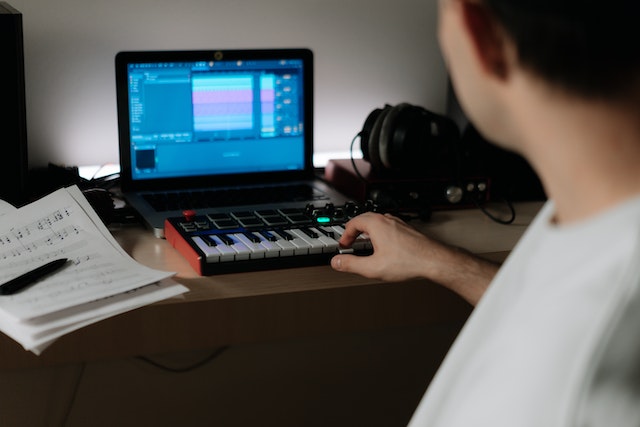Love music? Humming songs all day? If so, compose music! This blog post is your complete guide to music creation, whether you want to write fascinating film scores or chart-topping hits. We’ll discuss different styles of composing, how to unleash your creativity, crucial tools, and where to discover information. Let’s explore music composition using headphones!
Composing music types and pros/cons
Composing music has several styles. Classical composition, which allows complex harmonies and arrangements, is popular. This style often demands advanced music theory and notation.Film scoring involves musicians creating soundtracks for films and TV shows. Music can assist screen storytelling in this genre.
Electronic music composing may suit those who like to experiment with sounds and genres. Composers may now use software synthesizers and digital audio workstations to make distinctive electronic beats and textures. Pop composition emphasizes memorable tunes and approachable lyrics. Hooks that stick in people’s heads and get them singing are key.
Each kind of composing has pros and cons. Classical composing demands a substantial understanding of classical musical approaches yet may allow orchestral or ensemble involvement. Film scoring has tight deadlines to coordinate music with visual signals yet offers a big stage to exhibit your talent. Electronic music composition allows for infinite exploration but demands production skills for professional outcomes. Pop songwriting relies on market trends and offers stardom if you write a hit. Explore different composing styles to expand your musical horizons and find your voice.
How do you write music?
Music composition lets you express yourself through sound. Whether you’re a beginner or a seasoned composer, you need principles to guide your music. Start with these tips:
1. locate inspiration. Great music, strong emotion, or nature’s noises could do this. Explore diverse music genres and styles.
2. Establish Structure: Every composition needs structure, therefore choose a form or plan. Will it repeat the A-B-A sections? A looser arrangement? Try different structures until you discover one that fits your song.
3. Create Memorable Melodies and Harmonies: Melodies are the heart of any music, therefore spend time creating captivating tunes. Try different chord progressions and harmonies with your melodies.
4. Use Dynamics and Tempo: Try different volume levels to bring depth and emotion to your songs. Tempo also affects a song’s mood, whether it’s upbeat or sad.
5. Experiment with instruments! Try keyboards/piano, guitar, synth, etc. when composing. Each instrument adds its own flavor to your piece.
These criteria are only recommendations; what counts most is expressing yourself via music.
Music industry tools
As a composer, you require numerous vital tools. These tools will improve your workflow, creativity, and music production. First, a trustworthy PC or laptop is essential. Make sure your Mac or PC has enough processing power and storage for advanced music creation applications. All your writing will happen here. Buy a DAW. FL Studio, Logic Pro X, and Ableton Live are alternatives. Choose one that meets your demands and master its characteristics. Record, edit, arrange, mix, and master on a DAW.
Get a portable MIDI controller or keyboard to record musical ideas while performing. This small device lets you play melodies and chords into your DAW without mouse clicks. Mixing and mastering require studio monitors or headphones. They show frequencies so you can EQ and balance your compositions.
Quality virtual instruments extend your sound repertoire. These plugins may create distinctive sounds in any genre, from realistic orchestral libraries to cutting-edge synthesizers. Don’t forget cables (XLRs), microphone stands/booms if recording vocals/instruments, an external hard drive for backing up projects, an audio interface for connecting microphones/guitars/keyboards, MIDI cables if using hardware synths, and proper acoustic treatment if working in a dedicated studio. When writing music professionally, these vital music products provide creative freedom and excellent outcomes!
How to compose music?
Composing music is fun and rewarding. Here are some composition tips for beginners and experienced musicians. Explore music genres and styles. This will help you understand how genre elements can be blended to produce distinctive compositions. Learn music theory. A rudimentary understanding of chords, scales, and rhythm will substantially improve your composition skills.
Next, get inspiration from nature, emotions, and music. Keep a notebook to record daytime ideas. Try different melodies and harmonies on your instrument or software once you have some ideas. Creativity thrives on risk-taking and experimentation. Collaboration helps composers grow too. Join online groups of musicians to share your work and get comments. Practice often! Composing takes time and practice. Compose daily or weekly within devoted time. Composing music is about expressing yourself through sound. So embrace your unique flair and enjoy bringing your musical thoughts to reality!
Where can we buy music-composing supplies?
Finding the correct tools and solutions for music composing is crucial. High-quality instruments, software, and resources may help any composer. Where can you buy music gear? Fortunately, the House of Marley offers many possibilities. Let’s examine some:
1. Online Marketplaces: Amazon, eBay, and Sweetwater sell music production equipment and software. Their broad catalogs include MIDI keyboards, synthesizers, recording interfaces, and studio monitors.
2. Music Stores: Musicians still get gear from local music stores. Before buying, try instruments in your local store.
3. Manufacturer Websites: Many instrument makers sell directly online. This ensures authenticity and warranty coverage for the latest releases.
4. Specialty merchants: Some merchants sell professional audio gear and software for composers and producers. Niche boutiques generally have knowledgeable employees who can assist you make the best choices for your needs.
5. Online Communities: Joining forums or social media groups dedicated to composing music is another fantastic approach to find recommended products from fellow artists who have used them.Always investigate a music product’s features, compatibility with your setup (if relevant), user reviews/ratings, and industry reputation before buying.
Quality tools that match your musical style and aims as a composer will boost productivity and composition quality.With this knowledge about composing music approaches, their pros and cons, and principles, you’re ready to start your creative journey.





